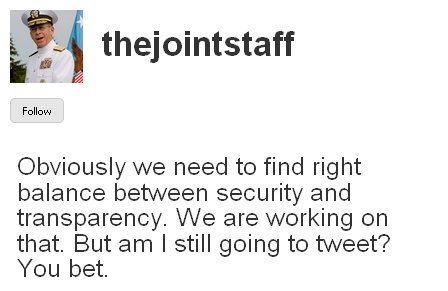Head of Joint Chiefs bucks social media ban in a Tweet
Adm. Mike Mullen says the right balance between security and transparency needs to be found because Defense cannot ignore social networking tools.
While the Marine Corps banned the use of social networking sites on Tuesday, the chairman of the Joint Chiefs of Staff, a budding Tweeter, strongly backed the use of the social networking site in a message he posted on Twitter.
"Obviously we need to find right balance between security and transparency," Adm. Mike Mullen Tweeted after the Marine Corps said it would ban social networking sites. "We are working on that. But am I still going to tweet? You bet."
Last month the Defense Department kicked off a study to determine the vulnerabilities of social networking sites and Web 2.0 technologies such as Facebook and Twitter.
Navy Capt. John Kirby, Mullen's spokesman, said, "The chairman is committed to find a way to use social media while ensuring operational security."
Mullen, who also has a Facebook page , believes that social network sites help Defense engage in a dialogue with audiences at home and abroad. Mullen believes "we cannot afford to ignore this way [social network sites] of communicating with people," Kirby said.
Kirby said he expected Defense's study on use of social networking tools and technologies to be completed within a month.
 Mullen's message was posted Wednesday.
Mullen's message was posted Wednesday.
Other top commanders who have posted a personal Facebook page include Army Maj. Gen. Ray Odierno , commander of the multinational forces in Iraq, and Lt. Gen. Rick Lynch , commanding general of the III Corps at Fort Hood, Texas, said Lindy Kyzer, an Army spokeswoman who works in the online and social media division.
In a blog item posted on Tuesday , Kyzer summarized the conflicts between security and open access. "The popularity of social networking sites and sheer volume of information posted and traded can send shudders down the spines of any signal company soldier or network security expert," she wrote. "But many of those security experts realize that a collaborative Web is the new reality. Soon you'll be hard-pressed to find any site on the World Wide Web that isn't implementing Web 2.0 tools and technology.
"Soldiers in Iraq and Afghanistan have already been battling the issue of access to their work computers for years. . . . Our soldiers have been working around the access issues -- and will continue to do so -- regardless of whether or not we don't have access at our work computers. So, again, I want open access. But, I also want a lively debate that takes into consideration the security concerns, but balances them with the need to do our jobs to tell the Army's story in every platform and via every tool available."
Adm. Thad Allen, commandant of the Coast Guard, also has posted a Facebook page and opened a Twitter account . The Coast Guard allows its personnel to post to social networking sites from their computers, said Lt. Connie Braesch, the service's social media action officer.
Like the Marine Corps, the Coast Guard expects service members to not compromise security or classified information when they post messages on social network sites, she said.
Asked if Defense can stuff the social network genie back into the bottle, Kirby said, "I have a news flash for you: The Internet is here to stay."
NEXT STORY: A Social Network Happy Medium






